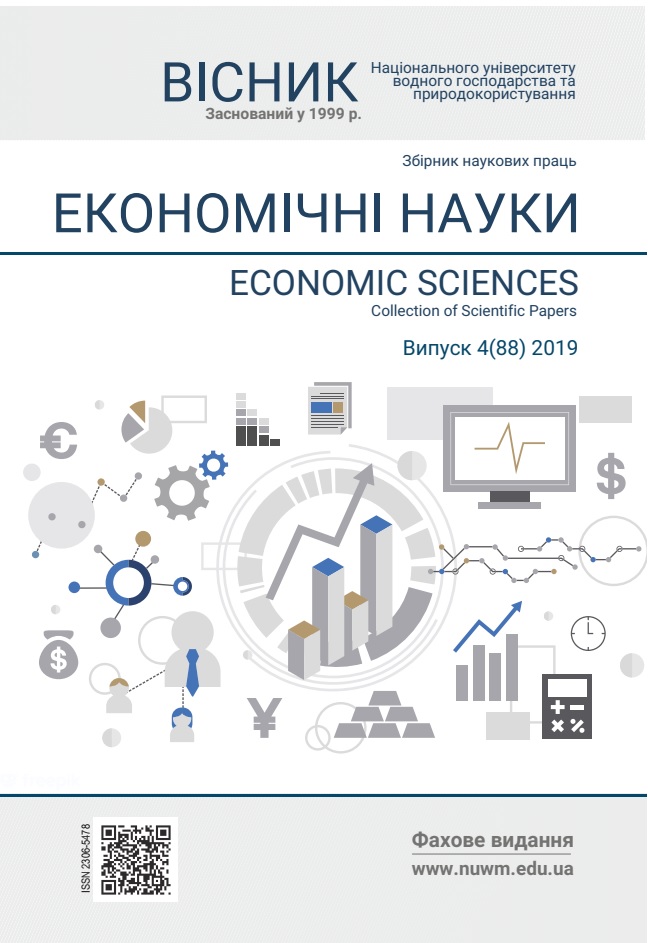PROSPECTS FOR THE DEVELOPMENT OF INTERNATIONAL ECONOMIC RELATIONS IN THE FIRST HALF OF THE 21ST CENTURY
DOI:
https://doi.org/10.31713/ve4201929Keywords:
relations, international economic relations, international economy, globalization, tendencies.Abstract
The article outcome summarizes that in the 21st century anintense globalization of investment and production activities isobserved in the world economy that leads to gradual integration ofhistorically separate and distinct economies into a single marketeconomy. In the course of this process, a new economic system isbeing created, in which the barriers on the way to internationalinvestment, production and trade activities are completely eitherabsent or minimized. In terms of global economy, most countries ofthe world have obtained almost free access to international marketoutlets, technologies and external financial resources. It has beenestablished that the current state of international economic relationsis characterized by both significant economic and financial imbalancesbetween countries and the lack of a single approach to the goals andmeasures of state economic policy.It has also been abstracted out that the mechanism of realizationof international economic relations is a set of legal norms andinstruments concerning their implementation (international agreements, treaties, conventions, codes), which are adopted atnational and interstate levels, and global international economicorganizations.One of the main characteristics of modern internationaleconomic relations is that they reflect the features of a fundamentallynew process, that is, the globalization of all aspects of social life(economic, political, social, spiritual). The detailed analysis of moderninternational economic relations on the global stage has enabled toreveal the main tendencies in their development. Firstly, thetendencies of large volumes of exchange, incomparably highernumber of subjects and more large-scale (global) and toughcompetition between goods, services, sellers, and buyers, in line withmuch higher losses during competitive struggle. Secondly, animportant tendency is a specific infrastructure of functioning ofinternational economic relations in the form of internationalstandardization and certification of manufacture and production,development of international transportations, communication,information environment, world currency market, etc. Thirdly, theyinclude a special system of regulation of international economicrelations at the national level (in the form of foreign trade policy ofstates), bilateral (in terms of bilateral agreements), regional (in termsof integrational associations) and international (under the aegis ofinternational organizations). Finally, its tendency is much greaterinterconnection and interdependence of separate forms ofinternational economic relations in comparison with identicalconnections in the domestic market.References
Довбенко М. Криза економіки – не криза науки : монографія. К. : ВЦ «Академія», 2009. 304 с.
Базилевич В. Д. Економічна наука та освіта в епоху системних трансформацій: нові виклики і запити до фундаментальної теорії. Економіка України. 2016. № 8. С. 78–90.
Небрат В. В. Еволюція теорії державних фінансів в Україні : монографія. НАН України, Ін-т екон. та прогнозув. К., 2013. 584 с.
Фридман М. Методология нормативной экономической науки. Философия экономики. Антология. М. : Изд. Института Гайдара, 2012. С. 177–216.
Камінська Т. В. Тенденції сучасних процесів глобалізації. Проблеми підвищення ефективності інфраструктур : зб. наук. праць. К. : НАУ, 2011. Вип. 29. С. 49–59.
Kамінська Т. В. Особливості міжнародної економічної інтеграції на сучасному етапі глобалізації. Науковий вісник Ужгородського університету. Сер. Економіка. 2011. Спецвипуск 33. Ч. 1. С. 122–126.
Кирилич Х. В. Проблема нерівності економічного розвитку світового господарства : дис. … канд. екон. наук : 08.00.02. Львів, 2015. 188 с.
Ханін І. Г., Сазонець І. Л. Теорія транснаціоналізації світової економіки : підручник. Донецьк : Юго-Восток, 2011. 280 с.
Gladchenko, A. Sardak, S. and Dzhyndzhoian, V. Foreign experience of public administration in the context of the economic equilibrium of synthetic economic crisis. Modern European Researches. Salzburg, Austria, 2017, Vol. 2. pp. 44–52.
REFERENCES:
Dovbenko M. Kryza ekonomiky – ne kryza nauky : monohrafiia. K. : VTs «Akademiia», 2009. 304 s.
Bazylevych V. D. Ekonomichna nauka ta osvita v epokhu systemnykh transformatsii: novi vyklyky i zapyty do fundamentalnoi teorii. Ekonomika Ukrainy. 2016. № 8. S. 78–90.
Nebrat V. V. Evoliutsiia teorii derzhavnykh finansiv v Ukraini : monohrafiia. NAN Ukrainy, In-t ekon. ta prohnozuv. K., 2013. 584 s.
Frіdman M. Metodolohіia normatіvnoi еkonomіcheskoi naukі. Fіlosofіia еkonomіkі. Antolohіia. M. : Іzd. Іnstіtuta Haidara, 2012. S. 177–216.
Kaminska T. V. Tendentsii suchasnykh protsesiv hlobalizatsii. Problemy pidvyshchennia efektyvnosti infrastruktur : zb. nauk. prats. K. : NAU, 2011. Vyp. 29. S. 49–59.
Kaminska T. V. Osoblyvosti mizhnarodnoi ekonomichnoi intehratsii na suchasnomu etapi hlobalizatsii. Naukovyi visnyk Uzhhorodskoho universytetu. Ser. Ekonomika. 2011. Spetsvypusk 33. Ch. 1. S. 122–126.
Kyrylych Kh. V. Problema nerivnosti ekonomichnoho rozvytku svitovoho hospodarstva : dys. … kand. ekon. nauk : 08.00.02. Lviv, 2015. 188 s.
Khanin I. H., Sazonets I. L. Teoriia transnatsionalizatsii svitovoi ekonomiky : pidruchnyk. Donetsk : Yuho-Vostok, 2011. 280 s.
Gladchenko, A. Sardak, S. and Dzhyndzhoian, V. Foreign experience of public administration in the context of the economic equilibrium of synthetic economic crisis. Modern European Researches. Salzburg, Austria, 2017, Vol. 2. pp. 44–52.

